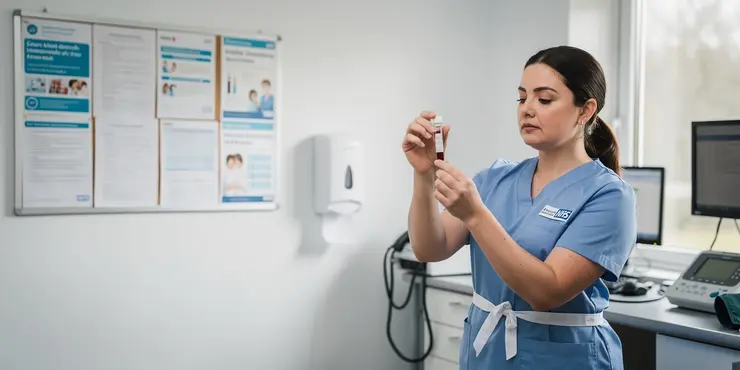
Find Help
More Items From Ergsy search
-
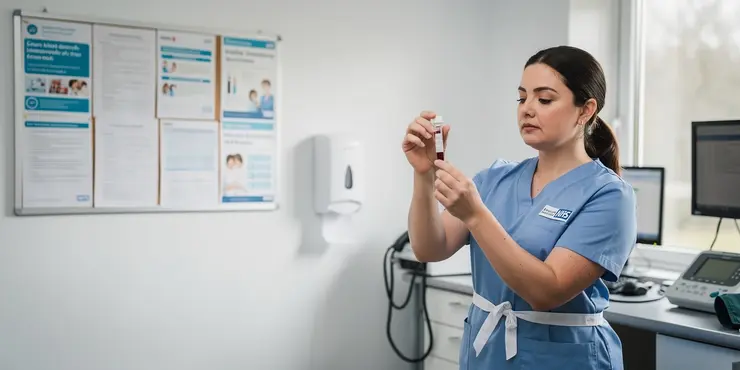
What is the most common disease transmitted by blood transfusion?
Relevance: 100%
-
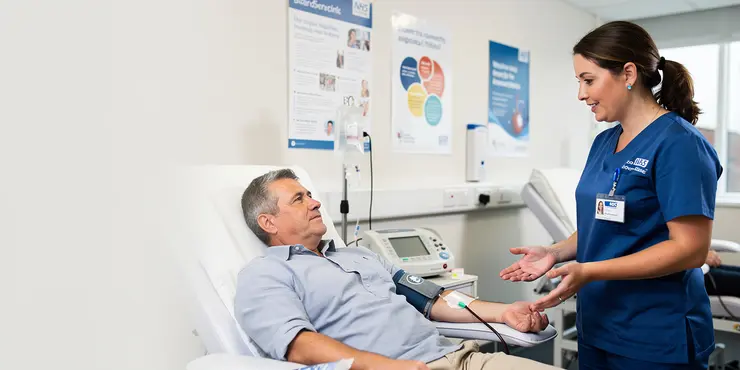
Are there any parasites that can be transmitted through blood transfusions?
Relevance: 82%
-

What diseases can be spread by blood transfusions?
Relevance: 80%
-

Is Chagas disease a concern with blood transfusions?
Relevance: 80%
-

Can syphilis be transmitted via blood transfusion?
Relevance: 79%
-
Can bacterial infections be transmitted through blood transfusion?
Relevance: 75%
-
Can Dengue fever be transmitted through blood transfusions?
Relevance: 75%
-
Can you get any prion diseases from blood transfusion?
Relevance: 71%
-
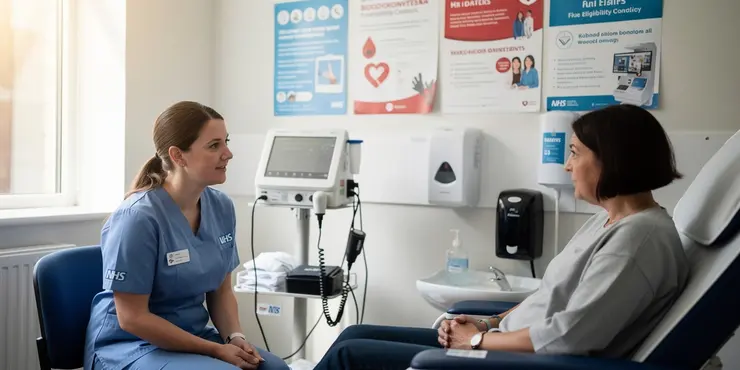
Can COVID-19 be transmitted through blood transfusions?
Relevance: 71%
-
Can HIV be transmitted through blood transfusions?
Relevance: 68%
-
What are some common reasons blood transfusions are needed?
Relevance: 67%
-
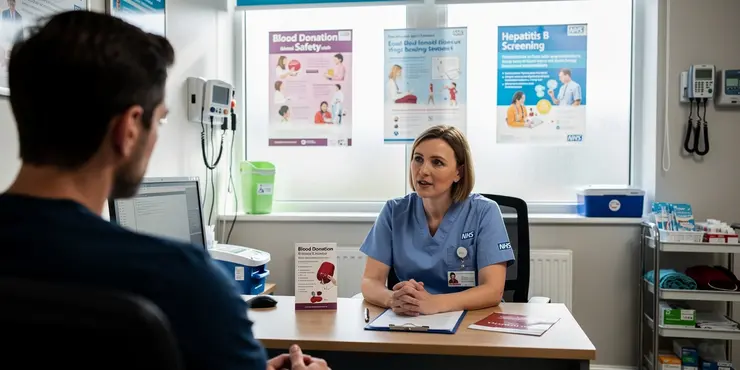
Is Hepatitis B a risk in blood transfusions?
Relevance: 66%
-

Is HTLV a risk in blood transfusions?
Relevance: 64%
-
What is a blood transfusion?
Relevance: 63%
-

What measures are taken to prevent disease transmission in blood transfusions?
Relevance: 63%
-
Is Zika virus screened for in blood transfusions?
Relevance: 61%
-
Is malaria still a concern for blood transfusion safety?
Relevance: 61%
-

Are there risks associated with blood transfusions?
Relevance: 61%
-
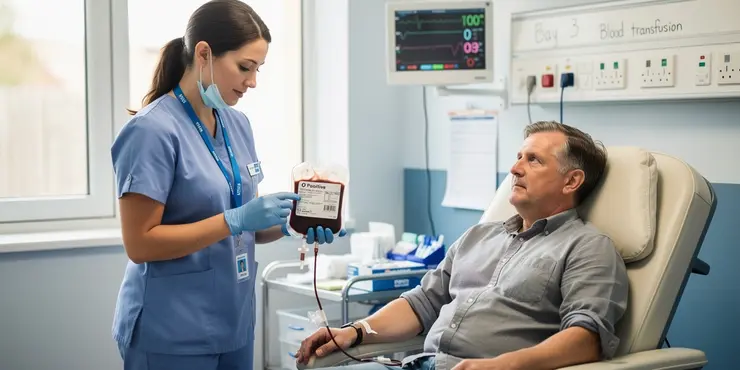
Blood Transfusion
Relevance: 60%
-
Why might someone need a blood transfusion?
Relevance: 60%
-
Blood Product Transfusions
Relevance: 59%
-
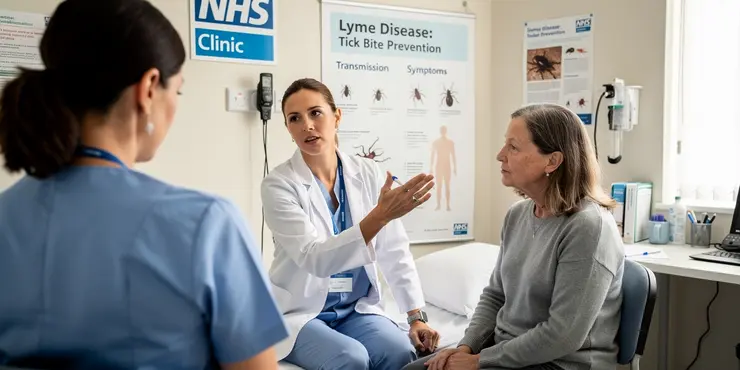
How is Lyme disease transmitted?
Relevance: 57%
-
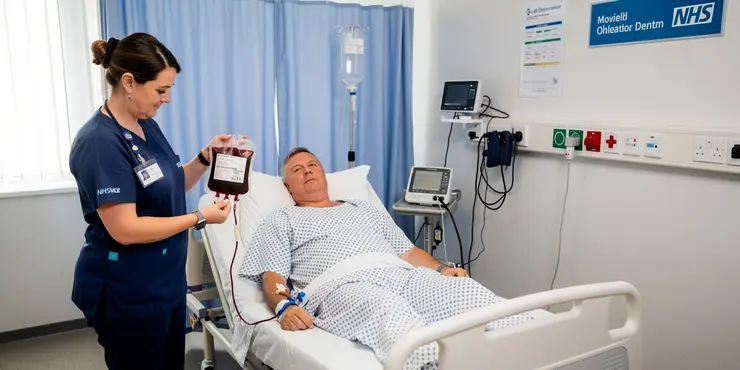
What types of blood products can be transfused?
Relevance: 56%
-
Is there an age limit for receiving blood transfusions?
Relevance: 54%
-
Can certain medical conditions prevent receiving blood transfusions?
Relevance: 53%
-

How is blood screened to prevent disease transmission?
Relevance: 53%
-
How long does a blood transfusion take?
Relevance: 53%
-
Can someone have a reaction to a mismatched blood transfusion?
Relevance: 51%
-

Can cytomegalovirus (CMV) be spread through transfusions?
Relevance: 51%
-
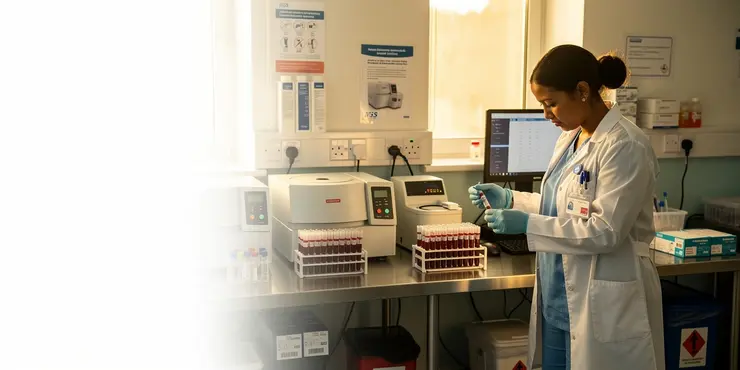
How do healthcare providers match blood for transfusions?
Relevance: 51%
-
Can people of any blood type receive a transfusion of any blood type?
Relevance: 50%
-

How do doctors determine how much blood is needed for a transfusion?
Relevance: 48%
-

How is West Nile Virus transmitted?
Relevance: 47%
-

How is HIV transmitted?
Relevance: 46%
-

How is the Zika virus transmitted?
Relevance: 44%
-
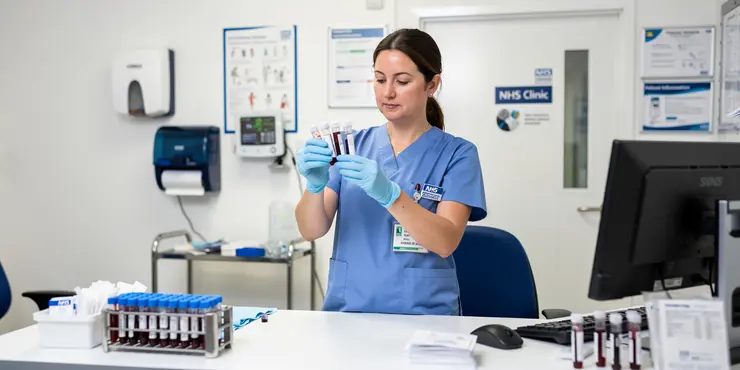
What other viruses are tested for in blood donations?
Relevance: 44%
-
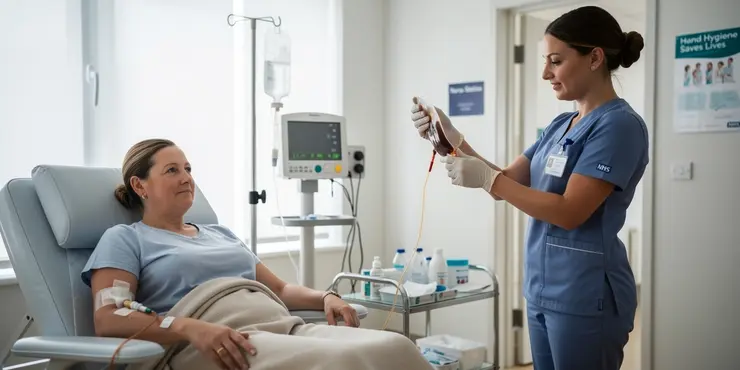
What is plasma, and why might it be transfused?
Relevance: 44%
-
Is blood used for transfusions safe?
Relevance: 43%
-
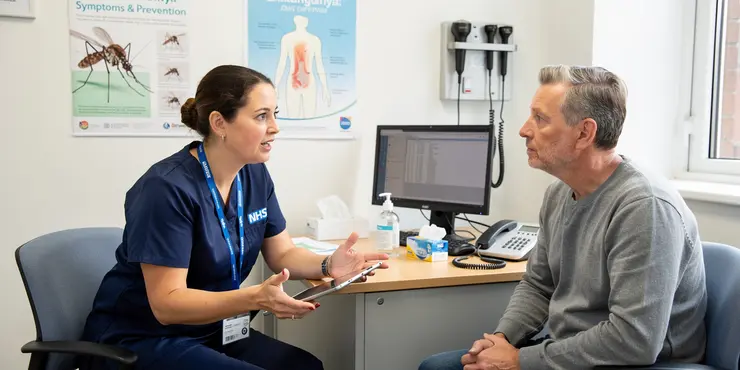
Can Chikungunya be transmitted from person to person?
Relevance: 42%
-
Can mosquitoes transmit any bacterial diseases in the UK?
Relevance: 41%
Introduction
Blood transfusions are a vital component of modern medicine, saving countless lives and supporting a multitude of medical procedures. However, as with any medical procedure, there are risks involved, one of which includes the transmission of blood-borne diseases. In the UK, stringent screening and testing protocols are in place to minimise this risk, but no system is completely infallible.
Most Common Disease Transmitted by Blood Transfusion
In the UK, the most commonly transmitted disease through blood transfusion has historically been Hepatitis C, although transmission rates have drastically decreased due to rigorous screening efforts. Prior to the implementation of effective screening measures in 1991, Hepatitis C was primarily spread through contaminated blood and needle sharing. Since then, the incidence of transmission via blood transfusion has become exceedingly rare in the UK, thanks to advanced screening technologies and donor questioning protocols that help identify and eliminate potentially contaminated blood.
Understanding Hepatitis C
Hepatitis C is a liver disease caused by the Hepatitis C virus (HCV). It can result in both acute and chronic liver infections, with the latter potentially leading to severe health ramifications such as liver cirrhosis, cancer, or liver failure. The virus often goes undetected for years as it may not show symptoms early on. In the UK, healthcare providers focus on early detection and treatment, allowing many individuals to lead healthier lives despite the infection.
Screening and Prevention Measures
The National Health Service (NHS) Blood and Transplant (NHSBT) service in the UK enforces comprehensive testing of all blood donations to significantly minimise the risk of disease transmission. Screening for Hepatitis C includes serological tests to detect antibodies and nucleic acid testing (NAT) to identify viral RNA. The advent of these tests has nearly eliminated the risk of transmission via blood transfusions in the UK today.
Other Blood-Borne Infections
In addition to Hepatitis C, other infections such as HIV, Hepatitis B, and Syphilis are also tested in blood banks across the UK. Although these diseases posed a higher risk in the past, advancements in screening technology have markedly reduced their transmission rates through blood transfusions. Vigilant screening ensures that the blood supply remains one of the safest in the world.
Conclusion
While the transmission of diseases like Hepatitis C through blood transfusion once posed a significant public health challenge, the current risk in the UK is minimal due to stringent screening and testing protocols. Continuous improvements in healthcare practices help maintain a safe blood supply and reinforce public confidence in blood transfusions. The NHS remains committed to ensuring the highest levels of safety for all patients receiving transfusions.
Introduction
Blood transfusions are very important in medicine today. They help save lives and support many medical treatments. But, like all medical procedures, there are some risks. One risk is getting diseases from the blood. In the UK, there are strong rules to check blood. These rules help keep the blood safe, but no system is perfect.
Most Common Disease Transmitted by Blood Transfusion
The most common disease passed through blood transfusion in the UK used to be Hepatitis C. But this has changed a lot because we test blood very carefully now. Before 1991, Hepatitis C spread through bad blood and sharing needles. Now, because of good tests and asking donors questions, getting Hepatitis C from blood transfusions in the UK is very rare.
Understanding Hepatitis C
Hepatitis C is a disease that affects the liver. It comes from the Hepatitis C virus (HCV). It can cause short-term and long-term liver problems. Long-term problems can be serious, like liver damage or cancer. Many people don't know they have it because there might not be signs for a long time. In the UK, doctors try to find it early and treat it, so people can live healthier lives.
Screening and Prevention Measures
The NHS Blood and Transplant (NHSBT) in the UK checks all blood donations. This helps to avoid spreading diseases. They have special tests to catch Hepatitis C early. These tests make sure blood transfusions are very safe in the UK today.
Other Blood-Borne Infections
Besides Hepatitis C, blood banks in the UK also check for other diseases like HIV, Hepatitis B, and Syphilis. These diseases used to be more of a problem, but testing has made them much less of a risk now. Careful checks help keep the blood supply in the UK very safe.
Conclusion
In the past, diseases like Hepatitis C from blood transfusions were a big worry. Now, in the UK, the risk is very low because of careful testing. The NHS works hard to keep the blood supply safe. This helps people trust blood transfusions and keeps patients safe.
Frequently Asked Questions
What is the most common disease transmitted by blood transfusion?
Hepatitis B is one of the most common diseases transmitted by blood transfusion.
How is Hepatitis B transmitted through blood transfusion?
Hepatitis B can be transmitted if the blood from a donor who is infected with the virus is used in a transfusion.
What measures are in place to reduce the transmission of diseases through blood transfusion?
Blood donors are screened for infectious diseases, and blood is tested for viruses like HIV, hepatitis B, and C to reduce transmission risks.
Why is Hepatitis B a concern in blood transfusions?
Hepatitis B is a concern because it can cause chronic liver disease and is highly infectious, making it a significant health risk.
Are there other diseases that can be transmitted through blood transfusion?
Yes, other diseases such as hepatitis C, HIV, and syphilis can also be transmitted through blood transfusions.
How has the risk of disease transmission through blood transfusion changed over time?
Advancements in testing and screening have significantly reduced the risk of disease transmission through blood transfusions.
What is NAT testing in blood transfusion?
NAT, or nucleic acid testing, is a sensitive method used to detect viral genetic material in blood, further reducing infection risks.
Can blood transfusions transmit bacterial infections?
While rare, bacterial infections can be transmitted if the blood is contaminated, but strict handling processes minimize this risk.
Is Malaria a risk in blood transfusion?
Yes, in regions where malaria is prevalent, there is a risk of transmission through transfused blood.
What is the window period in relation to blood transfusion safety?
The window period is the time after infection during which a disease is not detectable by screening tests.
How effective is blood donor screening in preventing disease transmission?
Blood donor screening, combined with testing, is highly effective and has greatly reduced transfusion-transmitted infections.
Can Zika virus be transmitted through blood transfusion?
Yes, Zika virus can be transmitted through blood, and measures such as donor screening and blood testing are in place to prevent this.
What are the symptoms of Hepatitis B?
Symptoms include jaundice, fatigue, abdominal pain, and dark urine, but some people may remain asymptomatic.
How can I be assured of safe blood during transfusion?
Ensure the blood is sourced from reputable facilities with proper screening and testing protocols in place.
Are there any long-term effects of receiving a disease through blood transfusion?
Yes, infections like hepatitis B can lead to chronic liver damage or other long-term health issues.
How common is it to contract a disease from a blood transfusion?
The risk is very low due to rigorous screening and testing, but it is not completely eliminated.
What should I do if I suspect I've contracted a disease from a blood transfusion?
Contact your healthcare provider immediately for testing and to discuss any necessary treatments.
Is there a vaccine available to prevent infection from blood-transmitted diseases?
There is a vaccine for hepatitis B, which can prevent infection if taken before exposure.
What role do blood banks play in ensuring transfusion safety?
Blood banks adhere to strict guidelines for collection, testing, and storage of blood to ensure safety.
Can routine blood tests detect transfusion-transmitted infections?
Certain infections can be detected through specific blood tests, but routine tests may not identify all potential transfusion-transmitted infections.
What disease is most often spread by blood transfusions?
When people get blood from others, diseases can spread. Some germs are in the blood. It is important to know which disease happens the most with blood transfusions.
Here are some tips to help you understand:
- Break down the question: What disease is usually spread when people receive blood?
- Use pictures or symbols to make it clearer.
- Ask someone you trust for help if you need it.
Hepatitis B is a sickness that can spread through blood. It is one of the most common sicknesses that people can get if they have a blood transfusion.
Here are some tools and tips that might help:
- Watch videos about Hepatitis B to learn more.
- Use pictures to help understand how it spreads.
- Talk to a doctor or a nurse if you have questions.
How can you catch Hepatitis B from blood transfusions?
Hepatitis B is a sickness you can get from someone else's blood. If blood from a person with hepatitis B is used to help another person, the other person can get sick too.
How do we keep blood transfusions safe from diseases?
When people need extra blood, doctors give them a blood transfusion. This means adding good blood to their body.
It is important the blood is safe. Here are some ways we make sure the blood is healthy:
- Testing: We test all blood to check for diseases.
- Questions: We ask people who give blood some questions. This helps to see if their blood is good.
- Cleanliness: We use clean tools and follow careful rules when taking and giving blood.
These steps help keep us safe from sickness.
People who give blood are checked to make sure they are healthy. The blood they give is tested for germs that can make people sick. They look for viruses like HIV and hepatitis B and C. This helps keep the blood safe and stops the spread of these viruses.
Why is Hepatitis B a worry in blood transfusions?
Hepatitis B is a virus. It can make people very sick. Sometimes, it is in the blood.
When people get a blood transfusion, they get someone else's blood. If the blood has Hepatitis B, it can make the person sick.
This is why doctors check blood carefully before a transfusion.
Some things that can help are:
- Talking to your doctor or nurse if you have questions.
- Using pictures or videos to learn more about Hepatitis B.
- Asking someone to read with you or explain things.
Hepatitis B is a disease that can make your liver very sick. It spreads easily between people, so it's important to be careful and stay healthy.
Can other illnesses spread through blood transfusions?
Yes, some illnesses can spread if you get blood from someone else. This is called a blood transfusion.
To stay safe, doctors check the blood very carefully. They make sure it is healthy and clean.
If you or someone you know is having a blood transfusion, talk to the doctor. Ask them how they make sure the blood is safe. You can also ask for any extra help, like a picture or list, to understand better.
Yes, you can also get other diseases from blood transfusions. These include hepatitis C, HIV, and syphilis.
Here are some tips that might help if you find reading hard:
- You can use pictures to help you understand better.
- Reading with a friend or helper can be nice.
- Try using your finger to follow the words on the page.
- There are apps that can read text out loud to you.
How has the risk of getting diseases from blood transfusions changed over time?
Blood transfusion means giving someone blood from another person. This can help when someone is very sick or hurt.
In the past, there was a bigger chance of getting diseases from blood transfusions. This is because doctors didn't have as many tools to check the blood.
Now, doctors and scientists have better ways to test the blood to make sure it's safe. This makes blood transfusions safer than before.
Using pictures or videos can help understand how transfusions work. Talking to a doctor or nurse can also help you feel more comfortable.
Better tests and checks mean there is a much lower chance of getting sick from blood transfusions.
What is NAT testing in blood transfusion?
NAT testing is a way to check blood before it is given to someone else. It looks for tiny germs in the blood that can make people sick. This helps keep blood transfusions safe.
Here are some ways to understand more:
- Use simple words when talking about blood tests.
- Look at pictures or videos about blood transfusions.
- Ask a grown-up or a doctor to explain it to you.
NAT is a test that looks for tiny parts of a virus in the blood. This helps find viruses early and makes blood safer.
Can you get a germ infection from a blood transfusion?
Bacterial infections from blood are not common. This can happen if the blood has bad germs in it. But we have careful ways to check the blood to keep it safe.
Can you get Malaria from a blood transfusion?
Malaria is a disease that comes from a tiny germ. It spreads when mosquitoes bite people.
Sometimes, malaria can be in the blood of people who have it. If a person with malaria gives blood, it might pass on malaria to the person who gets the blood.
This can happen, but there are ways to make it safer. Doctors check blood carefully before giving it to someone else. Special tests help make sure the blood does not have malaria.
If you have more questions, you can ask a doctor or nurse. They can explain and help you understand.
Yes, in places where people often get malaria, there is a chance that someone could get malaria from blood they receive.
What is the window period for safe blood transfusion?
"Window period" means the time when it is hard to know if someone has an infection. This is important for blood transfusions because we need to make sure the blood is safe.
During this time, tests might not show an infection even if there is one.
It is important to be careful and make sure blood is safe to give to others.
Tools to help understand more:
- Ask a doctor or nurse for more information.
- Use pictures or videos to make it easier to understand.
- Write down questions you have and ask someone you trust.
The window period is the time right after someone gets sick, but tests can't find the sickness yet.
How good is checking blood donors to stop the spread of diseases?
We check people who give blood to make sure their blood is safe. This helps stop diseases from spreading to people who need blood.
We use special tests to look for illnesses in the blood. We don't take blood from people if their blood is not safe.
Using these tests is a good way to stop people from getting sick when they receive blood.
For help reading, you can use text-to-speech tools. Listening to the text can make it easier to understand.
Checking blood donors and testing the blood works very well. It has made it much safer to get blood from other people.
Can you get the Zika virus from a blood transfusion?
The Zika virus can spread through blood transfusions. This means if you get blood from someone who has the Zika virus, you might get it too.
It's important to ask questions when you have blood transfusions. You can talk to your doctor or nurse if you are worried.
If you find reading hard, ask someone you trust to help explain it to you.
Yes, Zika virus can spread through blood. To stop this, blood donors are checked, and blood is tested.
What are the signs of Hepatitis B?
Hepatitis B is a sickness that affects the liver. Here are some signs:
- You might feel very tired.
- Your stomach could hurt.
- You may feel sick and throw up.
- Your eyes or skin might turn yellow. This is called jaundice.
- Your pee could be dark like tea.
- You might not feel hungry.
- Your joints and muscles could ache.
If you think you have these signs, tell a grown-up or see a doctor.
You can also use pictures or videos to help understand these signs better.
Some people have signs like yellow skin, feeling very tired, tummy ache, and dark pee. But some people might not show any signs at all.
How can I be sure the blood is safe during a transfusion?
Here is how to make sure the blood is safe:
- Talk to your doctor or nurse. Ask them if the blood is tested and safe.
- Make sure the hospital follows the rules for safe blood.
- Check if there is a special label that says the blood is safe.
If you do not understand, ask someone to help explain.
Make sure you get blood from trusted places that check and test it properly.
Can getting a disease from blood transfusion cause problems later?
If you get a disease from a blood transfusion, it might cause health problems later. Here are some ways to help understand:
- Talk to a doctor – They can explain things clearly.
- Use pictures – They can help you understand better.
- Ask questions – Don’t be afraid to ask if you don’t know something.
Yes, infections like hepatitis B can hurt your liver for a long time and make you sick.
Can you get sick from a blood transfusion?
Getting sick from a blood transfusion is very rare. Doctors are very careful. They test blood to make sure it is safe.
If you want to learn more, you can ask your doctor to explain.
The risk is very small because we check and test a lot, but it is not gone completely.
What should I do if I think I got sick from a blood transfusion?
Talk to your doctor right away. They can do a test and tell you what medicine you need.
Can you get a shot to stop getting sick from diseases that spread through blood?
Some diseases you get from blood have shots to stop them. These are called vaccines. Vaccines teach your body to fight off germs. This helps keep you from getting sick.
To learn more, you can:
- Ask your doctor about vaccines.
- Read easy health books with pictures.
- Watch videos made for kids about staying healthy.
There is a medicine called a vaccine for hepatitis B. It can stop you from getting sick if you get it before you come into contact with the disease.
How do blood banks help keep blood transfusions safe?
Blood banks collect and store blood. They test the blood to make sure it's safe. Blood banks make sure people get the right type of blood.
Tools that can help you understand:
- Pictures: Look at pictures of blood banks to see what they do.
- Videos: Watch videos that show how blood banks work.
- Ask for Help: Talk to someone who knows a lot about blood banks, like a nurse or a doctor.
Blood banks follow very strict rules. They do this for collecting, checking, and storing blood. This makes sure the blood is safe.
Can blood tests find infections from blood transfusions?
Blood tests can help find infections that can be passed on through blood transfusions. If you want to know more, talking to a doctor can help. They can use special tools and techniques to keep you safe and healthy.
Some germs and bugs can be found with special blood tests, but not all tests can find every bug that might come through a blood transfusion.
Useful Links
This website offers general information and is not a substitute for professional advice.
Always seek guidance from qualified professionals.
If you have any medical concerns or need urgent help, contact a healthcare professional or emergency services immediately.
Some of this content was generated with AI assistance. We’ve done our best to keep it accurate, helpful, and human-friendly.
- Ergsy carfully checks the information in the videos we provide here.
- Videos shown by Youtube after a video has completed, have NOT been reviewed by ERGSY.
- To view, click the arrow in centre of video.
- Most of the videos you find here will have subtitles and/or closed captions available.
- You may need to turn these on, and choose your preferred language.
- Go to the video you'd like to watch.
- If closed captions (CC) are available, settings will be visible on the bottom right of the video player.
- To turn on Captions, click settings .
- To turn off Captions, click settings again.
More Items From Ergsy search
-

What is the most common disease transmitted by blood transfusion?
Relevance: 100%
-

Are there any parasites that can be transmitted through blood transfusions?
Relevance: 82%
-

What diseases can be spread by blood transfusions?
Relevance: 80%
-

Is Chagas disease a concern with blood transfusions?
Relevance: 80%
-

Can syphilis be transmitted via blood transfusion?
Relevance: 79%
-
Can bacterial infections be transmitted through blood transfusion?
Relevance: 75%
-
Can Dengue fever be transmitted through blood transfusions?
Relevance: 75%
-
Can you get any prion diseases from blood transfusion?
Relevance: 71%
-

Can COVID-19 be transmitted through blood transfusions?
Relevance: 71%
-
Can HIV be transmitted through blood transfusions?
Relevance: 68%
-
What are some common reasons blood transfusions are needed?
Relevance: 67%
-

Is Hepatitis B a risk in blood transfusions?
Relevance: 66%
-

Is HTLV a risk in blood transfusions?
Relevance: 64%
-
What is a blood transfusion?
Relevance: 63%
-

What measures are taken to prevent disease transmission in blood transfusions?
Relevance: 63%
-
Is Zika virus screened for in blood transfusions?
Relevance: 61%
-
Is malaria still a concern for blood transfusion safety?
Relevance: 61%
-

Are there risks associated with blood transfusions?
Relevance: 61%
-

Blood Transfusion
Relevance: 60%
-
Why might someone need a blood transfusion?
Relevance: 60%
-
Blood Product Transfusions
Relevance: 59%
-

How is Lyme disease transmitted?
Relevance: 57%
-

What types of blood products can be transfused?
Relevance: 56%
-
Is there an age limit for receiving blood transfusions?
Relevance: 54%
-
Can certain medical conditions prevent receiving blood transfusions?
Relevance: 53%
-

How is blood screened to prevent disease transmission?
Relevance: 53%
-
How long does a blood transfusion take?
Relevance: 53%
-
Can someone have a reaction to a mismatched blood transfusion?
Relevance: 51%
-

Can cytomegalovirus (CMV) be spread through transfusions?
Relevance: 51%
-

How do healthcare providers match blood for transfusions?
Relevance: 51%
-
Can people of any blood type receive a transfusion of any blood type?
Relevance: 50%
-

How do doctors determine how much blood is needed for a transfusion?
Relevance: 48%
-

How is West Nile Virus transmitted?
Relevance: 47%
-

How is HIV transmitted?
Relevance: 46%
-

How is the Zika virus transmitted?
Relevance: 44%
-

What other viruses are tested for in blood donations?
Relevance: 44%
-

What is plasma, and why might it be transfused?
Relevance: 44%
-
Is blood used for transfusions safe?
Relevance: 43%
-

Can Chikungunya be transmitted from person to person?
Relevance: 42%
-
Can mosquitoes transmit any bacterial diseases in the UK?
Relevance: 41%


